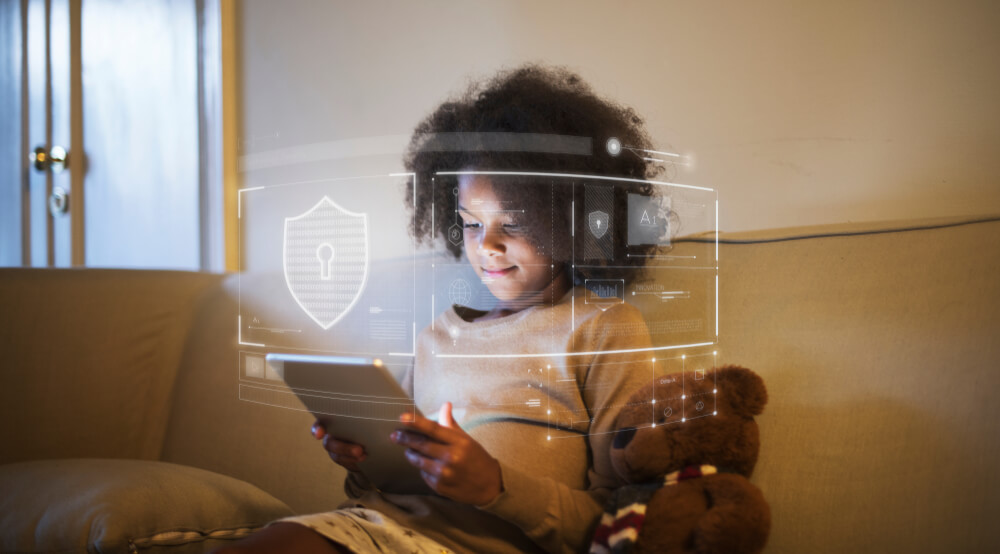Early use of digital technology has been shown to improve language skills in young children, as well as helping to promote their creativity and social development. However, it’s not without risks. Threats to children online include cyberbullying and harassment, invasions of privacy, exposure to inappropriate content and dangerous sexual online activities.
You might be asking yourself how can you teach your children to use the internet safely if there are so many threats out there. Things like parental controls, apps and tracking software can help you protect your children. However, the most effective way to keep your kids safe is to talk with them about the risks online, how to avoid them and that they can come to you for help if something goes wrong.
This means internet safety for kids and young people depends on parents being aware of the risks online and understanding how they can help their children avoid them. That’s why we put together this internet safety guide with some online safety tips to help parents keep their kids safe from online threats.
How Your Kids Get Online
Kids these days have easy access to the internet through an increasing number of means. My younger sister knows how to use smartphones and has her own tablet at an age when I didn’t even have access to a family computer. Children are now able to socialise in online games and social media apps and exist in a large digital community through tablets, mobile devices and computers.
Even younger children are accessing the internet in large numbers. According to a 2018 Ofcom report, 52% of 3 to 4 year olds go online for nearly 9 hours a week. In addition, 19% of them own their own tablet. Those numbers only increase for 5 to 7 year olds, with 42% of them owning their own tablet and 82% of them spending a similar amount of time online each week.
The same report shows that internet use increases as children get older, with 99% of 12 to 15 year olds going online for over 20 hours a week. However, smartphones overtake tablets as the most popular means to access the internet with 83% of 12 to 15 year olds owning their own smartphone. In addition, 71% of those that own a mobile phone are allowed to take it to bed at night.
Talking To Your Children About Internet Safety
With so many children and young people going online regularly it is important that parents speak to their children about the online risks they may face and how to deal with them. Parents are the most trusted adults that kids will turn to if something goes wrong, so having a dialogue with them about the risks and consequences is one of the most important steps you can take to ensure their safety online.
Of course, the first step is understanding those risks yourself. This requires you to be up-to-date on the latest technologies, apps and social media trends. Which can be exhausting, but does leave you better prepared to talk to your kids about what you expect online, and makes talking to them about their interests easier too.
Online Threats To Children
One of the online risks that concern parents the most is their young children coming across inappropriate content online. This can include images, videos or just written content of a sexual, violent or hate-filled nature. Another big concern for parents is their children talking to or interacting with strangers and sexual predators.
Not only do children have to be wary of things like strangers and dangerous websites, but they are also more vulnerable to traditional online threats such as malware, online fraud and scams and social engineers attempting to steal their personal information. Teaching your kids about these types of online threats help to prepare them for a life of using the internet and will help them maintain their online privacy.
By maintaining an open dialogue with your kids you will be able to reassure them that you are looking out for their safety. This also helps them to feel comfortable talking to you about some of the things they will encounter online. Be sure to listen to their questions and concerns, which will also help you in understanding what your children are doing online.
Setting Rules For Internet Use
Setting some clearly defined rules for internet use, and taking the time to explain the reason behind the rule and the risk it protects against, is a great way to teach your kids about the risks online, as well as keeping your children safe.
Be clear what they can and can’t do online. This usually comes down to not doing anything that you wouldn’t do in real life, such as cyberbullying or speaking to strangers. These common rules help to protect your children’s privacy, personal information and safety.
- Do not chat with strangers
- Never agree to meet someone you have only met online
- Do not give out any personal information, such as name, email address, phone number and home address
- Do not post your photo on public sites
- Don’t send hurtful, insulting or bullying messages
- Only use safe and secure sites to download music and games
- Set time limits for being online. Many smartphones have screen time apps that help you limit this.
Further Steps Parents Can Take To Protect Their Children Online
Discussing the dangers of being online and setting some basic rules for internet use are great ways to help keep your kids safe online. However, you can also take a more active role in protecting them from online risks. Much of this involves monitoring their internet use and how they access it.
In addition, you can also set up their tablet or smartphone in a certain way that will help you monitor and restrict their internet access. You can set passwords and rules for who can and can’t download apps for example, which prevents your children from accessing sites or apps that aren’t appropriate.
The majority of devices and computers come with privacy settings, security software and tools that help you limit access to inappropriate sites. In addition, you can activate safe search settings on search engines like Google as well as on YouTube. These steps will help to prevent your children from coming across any inappropriate content.
Some parents don’t feel comfortable monitoring their children’s internet use and browsing history. However, there are still steps you can take. For example, encourage your children to use their device in a common area of the home, this makes it less likely that they would visit sites you wouldn’t approve of. It also helps to make using the internet a fun family activity. If you do decide to monitor their internet history, make sure you discuss it with them first. Spying on your children without telling them can undermine their trust in you.
In addition, be careful with allowing your children to open any social media accounts or download any social media apps. Many social media sites have age restrictions in place, such as Facebook, which are designed to protect them.
In Summary
The internet can be a dangerous place if we aren’t careful, and children and young people are more at risk. By being aware of the dangers that children face online and by discussing it with them, parents can do a lot to protect their kids online.
Agree on boundaries, stay involved and explore the internet together. This helps your children to understand the risks and trust you with any problems they face and ultimately, makes using the internet a fun and much safer experience for all.



















“We were very impressed with the service, I will say, the vulnerability found was one our previous organisation had not picked up, which does make you wonder if anything else was missed.”
Aim Ltd Chief Technology Officer (CTO)